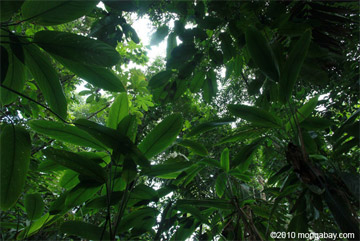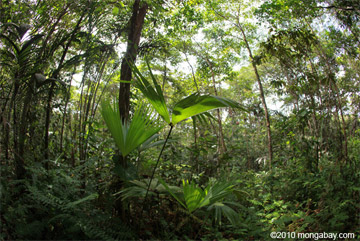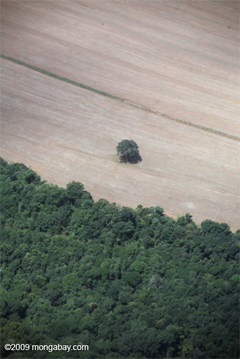The process to establish REDD+, a proposed climate change mitigation mechanism that would reduce greenhouse gas emissions by funding conservation and sustainable management of tropical forests (REDD+), is lacking in transparency and failing to include civil society organizations and indigenous peoples, say activists across forty NGOs.
On Tuesday, organizations led by the Rainforest Foundation UK, Friends of the Earth (USA & France), Global Witness and The Wilderness Society issued a statement criticizing the Paris-Oslo Process — which aims to establish a forests deal outside of a broader climate agreement — for “lack of genuine consultation in the drafting of the agreement” and “failing to take into account underlying issues that need to be tackled in the fight against deforestation.” The groups fear that lack of transparency in the decision-making process and allocation of the $6 billion in “fast-start” financing so far pledged to REDD+ could undermine the effectiveness of the forest conservation initiative as well as the overall progress on addressing climate change.
 Rainforest in Colombia. Photo by: Rhett A. Butler. |
“Ambitious steps must be taken now to reduce deforestation, but we also highlight the danger of donor countries rushing to disburse funds allocated for REDD on unsuitable projects that do not address underlying problems,” said the statement. “Rushing to channel money to REDD where the necessary governance and legislative ‘readiness’ is not yet secured would result in negative social and environmental outcomes overall. Difficult but much-needed policy and governance reforms are required in many countries to tackle the underlying drivers of deforestation and forest degradation in order to develop a more sustainable forest sector on a broad scale.”
“Unless underlying problems are addressed, so-called fast-start financing would be a false start for REDD.”
The statement comes on the heels of three days of climate talks in Bonn, Germany. The activist groups say they were excluded from participating in the discussions.
“To be successful, the Interim REDD Partnership Agreement must be a partnership not only of developed and developing states but also of civil society and indigenous peoples. Peoples living in and near forests will be most directly affected by REDD activities,” said the statement. “They must, therefore, have a seat at the table and adequate time to understand and comment on the proposed Interim REDD Partnership Agreement.”
 Rainforest in Colombia. Photo by: Rhett A. Butler. |
“A bad REDD system is worse than no system at all for the world’s climate, its forests and its people. If the Interim REDD Partnership focuses narrowly on emissions reductions and fails to take into consideration the need to establish mechanisms for implementing and monitoring the safeguards, ignoring the potential effects of REDD on human rights, biodiversity, and poverty, it sets itself up for failure and could easily do more harm than good.”
REDD+ — reducing emissions from deforestation and forest degradation in developing countries — is a proposed climate change mitigation mechanism that would reduce greenhouse gas emissions by paying developing countries to stop cutting down their forests. Tropical deforestation is the source of 12-17 percent of greenhouse gas emissions from human activities, a share larger than all the world’s cars, trucks, ships, planes, and trains combined.
 Forest clearing in Mato Grosso. Photo by Rhett A. Butler. |
A properly designed REDD mechanism is seen by many as a potentially cost-effective approach to simultaneously conserve forests, slow climate change, protect biodiversity, foster sustainable development, and maintain important ecological services provided by healthy forest ecosystems. But as highlighted in the latest statement, many concerns still remain, including financing to support the mechanism and provide sufficient economic incentives to stop deforestation; criteria for establishing credible deforestation baselines; technical aspects of monitoring and verifying change in forest cover; concerns over poor governance and illegal logging; international leakage, whereby forest conservation in one country drives deforestation in another; scale of implementation, including the debate over “national” versus “sub-national” projects; equity, including land tenure, ownership, and participation of forest-dependent communities; questions on how to address drivers of deforestation including consumption in rich countries; sustainable forest management (i.e. reduced impact logging) versus protection of primary forests as intact ecosystems; protection of biodiversity and environmental services in non-carbon-rich ecosystems; and controversies over carbon offsets and including forest carbon in market-based trading schemes.
Although an agreement on REDD+ has still not been signed, projects are already underway in a number of countries and industrialized countries have committed billions of dollars to REDD start-up initiatives via the UN-REDD Programme, the World Bank’s Forest Carbon Partnership Facility, and other entities. Once an agreement is finalized, 2013 is the earliest REDD would formally commence, following the expiration of the Kyoto Protocol.
CIVIL SOCIETY AND INDIGENOUS PEOPLES’ STATEMENT ON PARIS-OSLO PROCESS Monday 12th April
The Paris-Oslo process, which aims to establish an Interim REDD Partnership in Oslo on 27th May, must become more transparent and participatory, allow more time for genuine engagement with civil society and indigenous peoples’ organisations and ensure that it does not undermine the UNFCCC negotiation process.
A bad REDD system is worse than no system at all for the world’s climate, its forests and its people. If the Interim REDD Partnership focuses narrowly on emissions reductions and fails to take into consideration the need to establish mechanisms for implementing and monitoring the safeguards, ignoring the potential effects of REDD on human rights, biodiversity, and poverty, it sets itself up for failure and could easily do more harm than good.
Make Paris-Oslo process more transparent and participatory
The process to date has lacked genuine transparency and openness with lack of participation of civil society or indigenous peoples’ representatives at the table in either the first meeting in Paris on 11th March or the second meeting in Bonn on 12th and 13th April.
To be successful, the Interim REDD Partnership Agreement must be a partnership not only of developed and developing states but also of civil society and indigenous peoples. Peoples living in and near forests will be most directly affected by REDD activities. They must, therefore, have a seat at the table and adequate time to understand and comment on the proposed Interim REDD Partnership Agreement.
Beyond information-sharing to genuine consultation
Although we recognise the efforts of some countries to hold conference calls with civil society and indigenous peoples’ organisations, this is far from satisfactory and amounts to information-sharing at best, rather than genuine participation or consultation which would allow these stakeholders and rightsholders to influence the outcomes of the process.
Information-sharing must be accompanied by opportunities to engage in consultation through which civil society and indigenous peoples can provide meaningful inputs throughout the process – from framing the agenda to proposing workable solutions – and where clear feedback loops for the consideration and incorporation of such inputs exist.
Forest dwellers like indigenous peoples have a right to full and effective participation, in accordance with international human rights norms and principles, and in particular a right to give or withhold their free, prior and informed consent (FPIC) regarding decisions affecting their rights, including customary land rights. A failure to do so would be a violation of their rights.
Benefits of wider participation
Making space for meaningful consultation would greatly benefit the process. Civil society and indigenous peoples can contribute first-hand information and highlight issues before they become serious on-the-ground problems. There is compelling evidence that deforestation rates are lower and forest restoration improves where indigenous peoples and local communities have secure rights and are able to protect and manage their lands and forests. Early involvement of rightsholders will lead to a more effective (and ultimately faster) process to reduce forest loss over the long term. In contrast, a hastily developed agreement could generate more problems and unforeseen delays than solutions.
Extend 27th May deadline
The imposed timeline, which aims to finalise an Interim REDD Partnership Agreement by 27th May, does not allow enough time for meaningful participation of civil society and indigenous peoples in the process. It is likely to lead to resentment, lack of support and rejection of REDD by civil society and indigenous peoples at Cancun.
The proposed timeline does not allow adequate time for addressing the many issues at stake in the process, which include, inter alia: the support, promotion, operationalisation and MRV of safeguards; ensuring environmental and social integrity throughout the REDD cycle and establishing a specialised international complaints and recourse mechanism. Thus, the Oslo meeting in May should rather be a stepping stone that ensures a truly transparent and participatory process for developing the needed global framework for effective forest protection.
Avoid a rush to disburse funding rather than addressing underlying problems
Ambitious steps must be taken now to reduce deforestation, but we also highlight the danger of donor countries rushing to disburse funds allocated for REDD on unsuitable projects that do not address underlying problems. Rushing to channel money to REDD where the necessary governance and legislative ‘readiness’ is not yet secured would result in negative social and environmental outcomes overall. Difficult but much-needed policy and governance reforms are required in many countries to tackle the underlying drivers of deforestation and forest degradation in order to develop a more sustainable forest sector on a broad scale. Unless underlying problems are addressed, so-called fast-start financing would be a false start for REDD.
Do not undermine UNFCCC process
In addition, we underline that the UNFCCC Conference of the Parities remains the legitimate forum for agreement on REDD. The Paris-Oslo process must not undermine this. We are concerned with the lack of clarity on how the process would link with or report back to the UNFCCC.
Signed:
ARA (Arbeitsgemeinschaft Regenwald und Artenschutz) Germany
Australian Orangutang Project
Bank Information Centre, Washington DC
Centre d’accompagnement des Autochtones Pygmées et Minoritaires Vulnérables (CAMV), DRC (Africa rep UNREDD)
Centro Alexander von Humboldt, Nicaragua
Centro de Planificación y Estudios Sociales (CEPLAES) Ecuador
Civic Response, Ghana
ClientEarth
Community Research and Development Services (CORDS), Tanzania (IPs of Africa rep UN REDD)
Dignité Pygmée – DIPY (Pygmy Dignity), DRC
Dynamique des Groupes des Peuples Autochtones (DGPA), DRC
Eco Forestry Forum, PNG
Environmental Investigation Agency
FERN
Foker LSM Papua/Papua NGOs Cooperation Forum
Forest Peoples Programme (FPP)
Friends of the Earth Norway
Friends of the Earth Sierra Leone
Friends of the Earth US
Global Witness (Northern rep UNREDD)
Indigenous Peoples Links (PIP Links) London
International Institute for Environment and Development (IIED) London
Les Amis de la Terre France
Nepenthes, Denmark
OCEAN, DRC
Practical Solution Nepal
Pro Natura – Friends of the Earth Switzerland
Pro REGENWALD, Germany
Rainforest Action Network
Rainforest Foundation UK
Rainforest Foundation Norway
Reseau des Communicateurs de l’Environnement (RCEN)
Tebtebba
Tibet Justice Center and Tibet Third Pole
SONIA, Italy
Sustainability Watch Network, Central America
The Wilderness Society, Australia
Urgewald, Germany
WALHI – Friends of the Earth Indonesia
Wetlands International
Related articles














